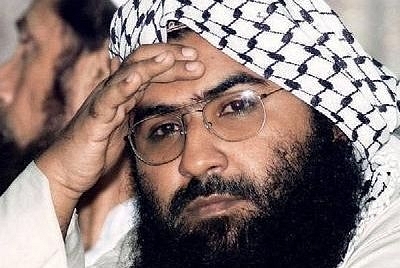Insta
The Terrorist That Got Away: Masood Azhar’s Journey In The World Of Jihad

Jaish-e-Mohammad chief Maulana Masood Azhar (Image via Twitter)
On 31 December 1999, India was forced to give up a 31-year-old terrorist Masood Azhar following the IC-814 hijacking. Now two decades on, the short, portly man once considered unfit for Jihadi training has grown into one of the biggest terror threats to the nation.
His History
Most infamously known for the creation of the islamic group Jaish-e-Mohammed, Masood Azhar’s connection with India dates back to the 1980’s, way before the terror outfit was even formed.
Hailing from Bahawalpur in Punjab, Pakistan, with a physique contrary to a usual terrorist, he was unable to complete the mandatory 40 day training to fight for Harkat-ul-Mujahideen, and was forced to run the terror outfit’s monthly magazine Sada-e-Mujahid. Having joined this group post his graduation (1989) from Karachi, he was later tasked with merging two splinter groups, Harkat-ul-Jihad Islami (HuJI) and Harkat-ul-Mujahideen, into the Harkat-ul-Ansar (HuA), during the times of growing militancy in Jammu & Kashmir.
His Arrest
In January 1994 during his visit to the Kashmir valley to meet with the cadre, Indian security forces arrested him. “He sang like a canary” is what an intelligence officer recalls from the time of his arrest. Even during his years in prison, he is said to have radicalised fellow inmates. The HuA leader, Sajjad Afghani tried to break him out of Kot Balwal prison, but failed miserably as Azhar got stuck in the narrow tunnel because of his bulky physique. Afghani was killed in the process. This is possibly why many believe that his greatest value for militant groups was that of a motivator and recruiter.
He was jailed in India for a period of five years, then handed over to Pakistani authorities in a hostage situation in 1999 - popularly known as the IC-814 Kandahar hijacking.
The Kandahar Hijacking
IC 814 on 24 December 1999, with 178 passengers and 11 crew members left Kathmandu for Delhi and was hijacked shortly after it entered the Indian airspace. The hijackers directed the pilot to fly to Lahore, but Pakistan fearing possible consequences of an Indian hijacked plane on its territory, refused permission. The pilot, Captain Devi Sharan then convinced them to allow him to land in Amritsar quoting fuel shortage.
The hijacking drama stretched over a week, with the aircraft suddenly taking off from Amritsar, refuelling in Lahore and heading to Dubai while making its final landing in Kandahar, Afghanistan - area controlled by Taliban at the time. The team of negotiators from India were unable to make a dent as the aircraft was now in hospitable territory, Taliban controlled Kandahar with whom India had no diplomatic relations. The government had no choice but to handover three dreaded terrorists Mushtaq Ahmed Zargar, Ahmed Omar Saeed Sheikh, and Mulana Masood Azhar to Harkat-ul-Mujahideen who is accused of the hijacking.
What Has He Done Since?
Post his hostile release, he reportedly met with Al Qaeda chief Osama bin Laden and Taliban founder Mullah Mohammed Omar in Afghanistan and went on to create the JeM in 2000. Since then, he’s been accused of multiple attacks in India - the Parliamentary attacks of 2001, after which he was placed under house arrest in Pakistan due to ‘lack of evidence’ to the 2016 Pathankot attack which led to no formal charges against, but just ‘protective custody’ in Pakistan.
Most recently, JeM has taken responsibility for the 2019 Pulwama attacks where a suicide bomber took down a CRPF vehicle killing 44 Indian military personnel.
Still Protected By China
The 50 year old Masood Azhar, despite being accused of multiple terror strikes against India and known to have radicalised youth across the World, is still not designated as a terrorist internationally. China, who is Pakistan’s all weather friend has repeatedly misused its veto power to block any resolution to declare him as a terrorist at the United Nations Security Council (UNSC).
Hero-worshipped in Pakistan, protected by China, one can only hope the World stands up for India’s cause this time round.
Introducing ElectionsHQ + 50 Ground Reports Project
The 2024 elections might seem easy to guess, but there are some important questions that shouldn't be missed.
Do freebies still sway voters? Do people prioritise infrastructure when voting? How will Punjab vote?
The answers to these questions provide great insights into where we, as a country, are headed in the years to come.
Swarajya is starting a project with an aim to do 50 solid ground stories and a smart commentary service on WhatsApp, a one-of-a-kind. We'd love your support during this election season.
Click below to contribute.
Latest